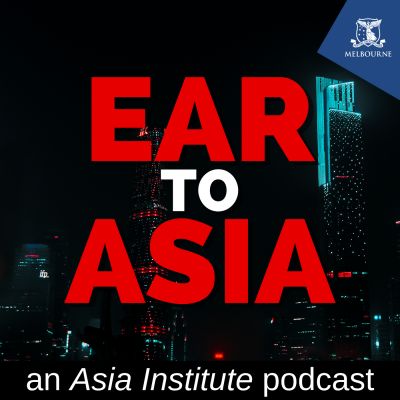On Ear to Asia, we talk with Asia experts to unpack the issues behind news headlines in a region that is rapidly changing the world. Ear to Asia is produced by Asia Institute, the Asia research specialists at the University of Melbourne, Australia. Subscribe to us on Apple Podcasts, Spotify, or wherever you get your podcasts.
https://rss.com/podcasts/ear-to-asia
Gesamtlänge aller Episoden: 4 days 4 hours 31 minutes
- 1
- 1
episode 141: Taiwan through the eyes of mainland Chinese writers and filmmakers
Despite China's official stance that reunification with Taiwan is non-negotiable, the perspectives of mainland Chinese writers, filmmakers, and television producers who have lived on the island are often far more nuanced. How have these artists reconciled their ties to the mainland with their experiences in Taiwan? What distinguishes the works of those who fled the mainland at the end of the Chinese Civil War from those who arrived in Taiwan decades later? Historian and translator Dr...
episode 141: Taiwan through the eyes of mainland Chinese writers and filmmakers
Despite China's official stance that reunification with Taiwan is non-negotiable, the perspectives of mainland Chinese writers, filmmakers, and television producers who have lived on the island are often far more nuanced. How have these artists reconciled their ties to the mainland with their experiences in Taiwan? What distinguishes the works of those who fled the mainland at the end of the Chinese Civil War from those who arrived in Taiwan decades later? Historian and translator Dr...
episode 142: China wants to remake global governance – is the world ready for it?
China's Global Civilization Initiative (GCI), proposed by President Xi Jinping in 2023, aims to reshape global governance by emphasising mutual respect between civilizations and common human values. While it ostensibly appears to embrace diversity, some analysts argue that it primarily serves China's own interests by reshaping international norms in favour of authoritarian regimes...
episode 143: As ethnic tensions rise, is there any real prospect of an inclusive Malaysia?
Malaysian society stands at a crossroads as ethnic tensions simmer, fueled by fiery rhetoric and a rise in Malay nationalism. Recent elections exposed a divided democracy, with populists pushing an agenda that strains the nation's multicultural fabric. Despite the absence of actual violence, social media is amplifying hate speech that paints minorities as threats, thus widening the rift between the Malay majority and other ethnic groups...
episode 144: How will Indonesia fare under new president Prabowo Subianto?
Indonesia, the world's third largest democracy, has elected Prabowo Subianto to be its next president in a sweeping victory. Yet, Prabowo, who enjoyed substantial support from Indonesia's young voters, is a controversial figure with a reputation marred by human rights violations, a history of anti-democratic rhetoric, and ties to the authoritarian regime of Suharto (1967-1998)...
episode 145: What China's ambitions in Pakistan mean for Baloch aspirations and identity
Straddling the boundaries of Pakistan, Iran, and Afghanistan, the Baloch people have long endured as a distinct ethnic group whose aspirations have been overshadowed by the ambitions of larger state actors. In Balochistan, in Pakistan's west, Baloch ethno-nationalist assertions of identity have long driven protests and petitioning directed at Islamabad -- occasionally taking the form of militant insurgencies...
episode 146: Iran’s strategy of outsourcing warfare in the Middle East
For decades, Iran has skillfully employed a network of proxy militant groups across the broader Middle East to project power and advance its interests, while maintaining an impression of plausible deniability on the global stage. At its core lies a "forward defence" strategy: pushing away or pre-empting threats from Iranian soil. Yet while this approach prioritises security, it also carries risks...
- 1
- 1
